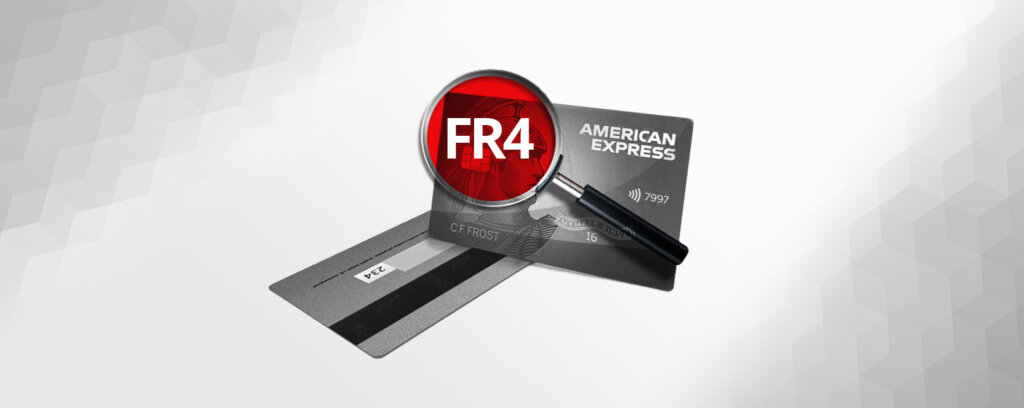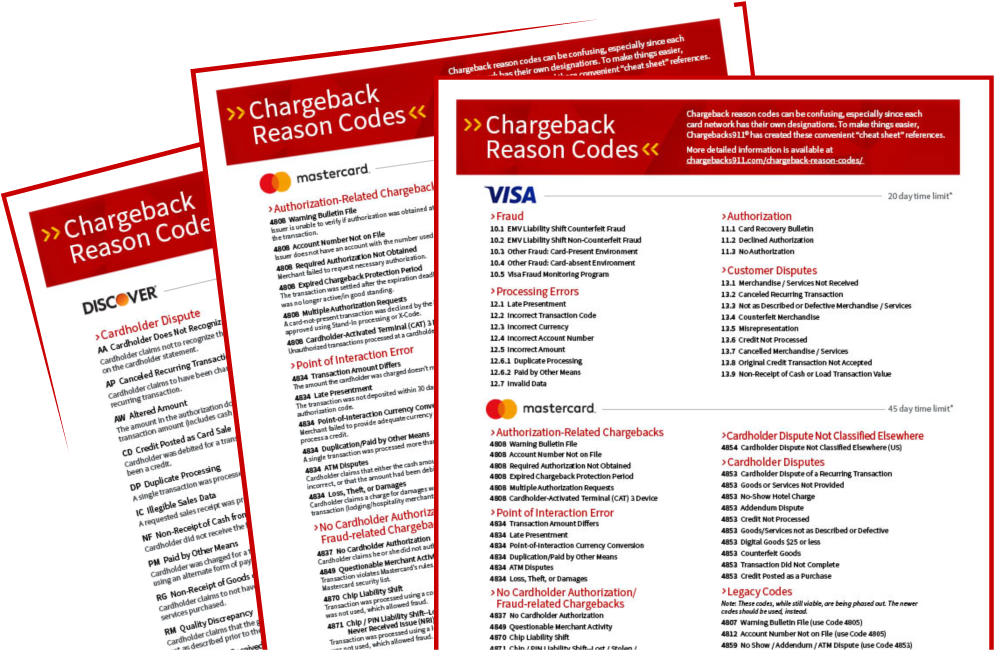
How to Handle Amex Reason Code FR4 Chargebacks
American Express breaks down the acceptable causes for a customer to dispute a credit card transaction in their dispute guidelines. This is done for the sake of simplicity and standardization.
Each chargeback trigger has a designated “reason code.” Amex can then assign the appropriate code to each case to show the given reason for the chargeback.
Learn more about Amex reason codes
Today, we’re looking at one reason code in particular — FR4 — and exploring the causes, timeframes, fees, and other specifics. We’ll also explore what you can do to prevent these chargebacks from happening.
Recommended reading
- Best Credit Card Processing Companies of 2025 REVEALED
- Chargeback Stats: All the Key Dispute Data Points for 2025
- What Happens When You Dispute a Transaction?
- Economic Uncertainty Pushes Consumers to File Chargebacks
- Charity Backed by Cb911® Featured on FOX13 Tampa Bay
- eCommerce Fraud Prevention: A Step-by-Step Guide for 2025
What is American Express Reason Code FR4?
American Express chargeback reason code FR4 is “Immediate Chargeback Program.” This reason code is used to explain that an Amex cardholder identified a charge on their statement, and denied authorizing that charge. Furthermore, this happened after your business was added to the Immediate Chargeback Program.
Once you’re in the Immediate Chargeback Program, you’ll have very limited options for chargeback responses.
Being added to the Immediate Chargeback Program means you cannot use compelling evidence to respond to a chargeback. Documentation like photos, customer signatures, and copies of email conversations are not admissible as evidence.
What is the Immediate Chargeback Program?
The Immediate Chargeback Program is an American Express dispute monitoring program. Like the Fraud Full Recourse Program, it’s intended for merchants who have received an excessive number of chargebacks.
American Express manages the program to identify merchants that submit an excessive number of fraudulent purchases for processing. It could be that the merchant in question is using outdated fraud detection tools, or is bypassing necessary security measures, and is failing to detect fraudulent transaction attempts as a result. Amex generally expects merchants to maintain a fraud ratio of less than 1% of transactions. If the merchant exceeds this, they may be added to the Immediate Chargeback Program.

When a cardholder disputes an Amex transaction, American Express will typically submit a merchant inquiry to get more information before filing the chargeback. Once a merchant is added to the Immediate Chargeback Program, though, American Express will skip these merchant inquiries.
Merchants can exit the program by reducing their overall fraud rate. Whether or not the merchant’s fraud rate is considered “acceptable” is determined by gauging the number of chargebacks against the merchant over a given period of time.
What Caused This Dispute?
Amex Chargeback Reason Code FR4 is primarily issued when a merchant that is already enrolled in the Immediate Chargeback Program receives a cardholder dispute. This could happen because:
The above examples are all valid reasons to dispute a charge. However, the majority of chargebacks filed by cardholders are examples of first-party misuse (commonly referred to as friendly fraud).
How to Respond to Amex Reason Code FR4 Chargebacks
Obviously, when faced with an Amex FR4 chargeback, your ultimate goal is to address the situation immediately.
Chargeback representment is the method you'd typically use to contest a chargeback. It's on you to present evidence to the card issuer (American Express, in this case) affirming every facet of the transaction to be legitimate and in compliance with the card issuer's rules. Reason code FR4 chargebacks are diffferent, though, as they restrict your representment possibilities.
If you're part of the Immediate Chargeback Program, Amex will deprive you of the opportunity to counter fraud-related chargebacks. This leaves you with only two plausible courses of action.
Keep in mind, you're working against a strict timeline. American Express only allows a 20-day window for you to present your reply. This period isn't exclusive to you though; it also covers the time it takes your acquirer to both notify you of a dispute and to evaluate and file your case. You'll typically end up with just under a week, or even less, to prepare and put forward your response.
How to Prevent Amex Reason Code FR4 Chargebacks
As the old adage goes, “an ounce of prevention is worth a pound of cure.”
You may never be able to stop chargebacks entirely. But, you can limit your exposure to risk and keep your chargeback ratio in good standing by adopting a few best practices. Generally speaking, you’ll want to:
#1 | Know Key Fraud Red Flags
Extra vetting procedures should be levied on new clients, particularly those who are spending a sizeable amount on their purchases. Additional indicators of potential fraudulent activity might include a high transaction speed, demands for fast shipping, and discrepancies in the billing address.
#2 | Use 3-D Secure
Uisng the newest version of 3DS 2.0 technology can significantly enhance buyer validation. Due to its low intrusiveness, it considerably reduces the chance of fraudulent transactions making their way past your security measures.
#3 | Adopt a Multilayer Approach
Employ a variety of fraud detection instruments that can work together and complement one another. Techniques such as proxy piercing, geolocation, CVV validation, and address confirmation are a few to consider.
#4 | Blacklist Known Fraudsters
Fraudulent activity should be traced back to its source account, which should then be added to a blacklist. This will restrict these accounts from carrying out future transactions with you, ensuring repeated victimization is avoided.
#5 | Update Your Software
Inefficient and older anti-fraud solutions may be incapable of tackling novel threats, and fraudsters may take advantage of such obsolete technologies. It's imperative to stay ahead of all software enhancements and patches and implement them promptly.
#6 | Deploy AI & Machine Learning
Machine learning technology uses past data and findings to sharpen fraud judgment. With the inclusion of more data, the decision-making process becomes more precise and smarter, thus making continuous improvements achievable.
Learn more about chargeback prevention
Take a Wider View
You can dispute invalid chargebacks from Amex reason code FR4. However, it’s much more efficient to take a proactive stance. The same is true of the other chargeback reason codes, as well. A truly effective chargeback management strategy must encompass prevention as well as disputing cases of friendly fraud.
Chargebacks911® can help your business manage all aspects of chargeback reason codes, with proprietary technologies and experience-based expertise. Contact us today for a free ROI analysis to learn how much more you could save.
FAQs
Does Amex investigate chargebacks?
Yes. American Express investigates chargebacks by reviewing the evidence provided by both the merchant and the cardholder to determine the legitimacy of the transaction and decide on the chargeback claim. This process ensures a fair resolution based on the documentation and arguments presented by both parties.
What is the reason code for a chargeback on American Express card?
An American Express chargeback reason code is a code that identifies the specific reason a cardholder or issuing bank has disputed a transaction, guiding the merchant on the nature of the dispute and what evidence may be required to contest it. Each code corresponds to a particular issue, such as unauthorized use, processing errors, or non-receipt of goods or services. Click here to see a full list of Amex reason codes.
Do police investigate chargebacks?
Police typically do not investigate chargebacks as they are considered a dispute between the merchant and the cardholder, handled through the card issuer's internal processes. However, if fraud is suspected as the cause of a chargeback, law enforcement may be involved in investigating the fraudulent activities.
How successful are Amex disputes?
The success of an American Express dispute depends on the merchant's ability to provide compelling evidence that the transaction was valid and in accordance with Amex policies. Success rates vary widely based on the nature of the dispute and the quality of the documentation provided by the merchant.
How does American Express investigate disputes?
American Express investigates disputes by reviewing documentation and evidence provided by both the cardholder and the merchant, such as transaction receipts, proof of delivery, or communication records, to determine the validity of the chargeback claim. This process aims to ensure a fair resolution based on the facts presented by both parties.









